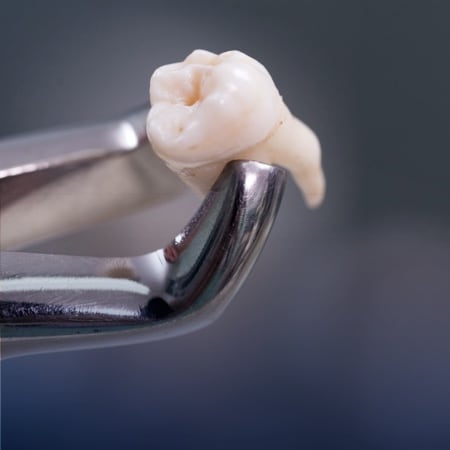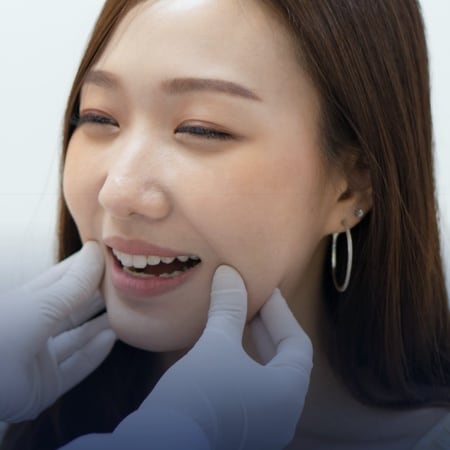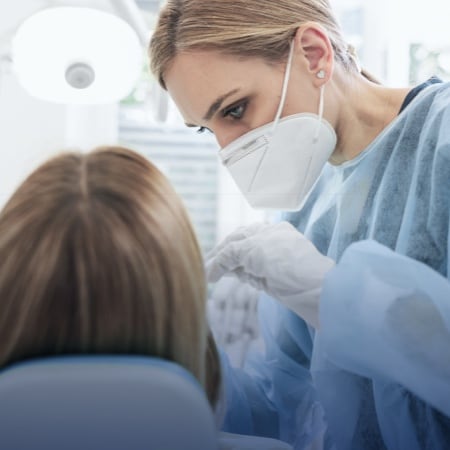Are you set to undergo oral surgery soon and aren’t sure how to prepare? Prior to the procedure, it’s important that you follow the instructions given to you by your dentist or oral surgeon. We know undergoing oral surgery can be nerve-wracking, but knowing exactly what to expect beforehand, how to prepare, and being given a list of thorough aftercare instructions can hopefully bring you a little bit of peace of mind knowing you’re not missing anything.
If you don’t understand the instructions given to you, never hesitate to ask questions. The better you understand, the more likely you are to experience stress-free surgery. Whether you’re having your wisdom teeth removed, jaw surgery, reconstructive surgery, etc., here are the ten most important steps you can take before your oral surgery creeps closer in order to make sure everything will run as smoothly as possible, and you’re not putting your health at risk:
What Are Dental Implants?
A dental implant is a way to completely replace a missing tooth or multiple missing teeth. A titanium screw will be surgically attached to your jawbone to act as the new “root” of your tooth. It may take around six months for the bone to heal, but you can still receive a dental crown within a couple of weeks. A customized dental crown, often made from porcelain, will be attached to an abutment tooth that’s screwed on top of the titanium post. Dental crowns look and feel just like your natural teeth, are very durable and are virtually stain resistant.
Dental implants can also act as an anchor for dental bridges and dentures. They’re carefully designed to last a lifetime, however, dental crowns may need to be replaced over time though they can also last upwards of 15-20 years following proper oral hygiene care.
1. Read The Instructions
After your surgery is scheduled, a CVOS team member will provide you with an information sheet that includes instructions you should follow that are specific to your procedure. Not only that, but the information sheet should also include things like risks and benefits associated with the procedure. Most importantly, it will outline what you have to do in order to prepare for the general anesthesia you’ll be given.
2. Rely On A Ride From Your Friend Or Family Member

After your surgery is scheduled, a CVOS team member will provide you with an information sheet that includes instructions you should follow that are specific to your procedure. Not only that, but the information sheet should also include things like risks and benefits associated with the procedure. Most importantly, it will outline what you have to do in order to prepare for the general anesthesia you’ll be given.
3. Don’t Eat Or Drink Anything The Night Before
You should not eat or drink anything the night prior to your oral surgery, including water. This time frame could be anywhere from six to 12 hours before your surgery, however, if you need to take medication, do so with a small sip of water. Not eating or drinking before anesthesia can reduce your risk of experiencing aspiration. Aspiration is when something enters your lungs by accident and sits there, causing trouble swallowing. This is due to the fact that anesthesia causes your muscles to relax, therefore, your reflexes have temporarily seized. The amount of time you have to avoid eating or drinking will depend on the surgery.

4. Avoid Smoking
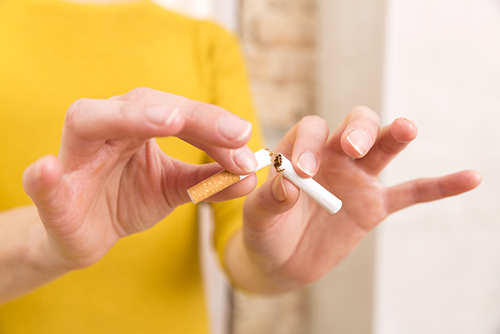
Again, it will depend on the surgery you’re undergoing, but it’s recommended to stop smoking anywhere from two to six weeks prior to your surgery. While even a day before surgery can decrease your chances of complications, the earlier you stop smoking, the better. Why? Because smoking decreases blood flow, therefore, the amount of time it takes for you to heal will take significantly longer. Smoking also increases your chances of infection. This is also why it’s recommended to avoid smoking if you proceed with dental implants.
5. Arrive Early
Once the date and time for your surgery arrives, remember to arrive early to take the time to complete any paperwork and ask any questions you may still have. Plus, it will give you a bit of time to relax before going in for surgery rather than feeling rushed. This doesn’t mean you need to be an hour or two early, but even just giving yourself 20-30 minutes will help.

6. Get A Good Rest

Your nerves may be running high, but getting a good night’s sleep before oral surgery, or any surgery for that matter, is important. If you’re struggling to fall asleep you can take a sleeping aid with a little bit of water. Feeling tired, or sick, while going into surgery just adds stress to your body and potentially puts your health even more at risk while under anesthesia.
7. Dress Appropriately
Make sure to dress comfortably for your surgery. Mainly because you won’t feel like changing afterward and it makes it easier for the surgical team to reach the blood vessels in your arm for the IV, checking your vitals, and taking your blood pressure if you’re wearing a t-shirt or a long-sleeve that rolls up easily. And, if you’re a contact lens wearer, you’ll want to leave those out during surgery since your eyes will be closed for a while. You’ll also be asked to remove any jewelry, so don’t bother putting any on. If you’re worried about jewelry holes growing in, put them back in as soon as you get home (or have someone assist you since your movement may be a bit off following anesthesia).
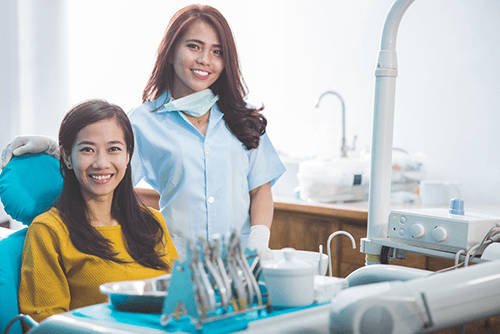
8. Head To The Pharmacy

One thing your dentist may suggest is picking up any oral medication before your surgery since you won’t be able to operate a vehicle afterwards for up to 48 hours. Some medications will also need to be taken the same day as your oral surgery, so it’s better to be prepared than wait. This also gives you an opportunity to go to the grocery store and stock up on soft foods, too! After oral surgery, whether it be a general tooth extraction, dental implant surgery, or reconstructive surgery, you’ll want to eat soft foods for at least the next week or two such as apple sauce, mashed potatoes, eggs, yogurt, oatmeal, and once tooth sensitivity decreases, ice cream or soup (temperatures that are too hot or too cold may cause discomfort/sensitivity at first).
9. Maintain Your Oral Hygiene
Leading up to, and following, your oral surgery, still maintaining your oral hygiene is very important. Before your oral surgery, brush and floss as normal, but again, make sure not to swallow too much water/toothpaste. After the procedure, make sure to brush your teeth very gently and avoid the extraction site/surgical site. This is when a soft-bristled toothbrush will come in handy. If you’ve had a tooth extracted, don’t swish around roughly and spit out water as this can dislodge the blood clot that is essential to your healing. After every meal, gently swish warm water and salt around to ensure your surgical site remains clean, however, this may not necessarily have to be done the first day. Your dentist may suggest doing this 12-24 hours after your surgery.

10. Rest, Rest, Rest

Now that your dental surgery is complete, it’s time to follow the most important rule of all: rest. You should not be left alone for the next 24 hours, and you should keep movement to a minimum during this time and for up to 48 hours. Trying to exercise too much too soon can also cause any blood clots to dislodge or increase blood pressure and cause more excess bleeding from the surgical site. Just rest your body and prop your head up to sleep for the next few nights to allow your body to drain more of the fluids from the surgical site properly. Lying flat on your back following a dental procedure can actually increase swelling and cause more bleeding.
How Do They Put You To Sleep For Oral Surgery?
Dentistry has come a long way since 600 A.D! Did you know that the Mayans utilized shells to replace mandibular teeth? And in ancient civilization in China, they would hammer bamboo pegs into patients’ jawbones. Rest assured there is no need to hammer anything into your jawbone anymore! All that’s required is a small slit in your gum line in order for your oral surgeon to carefully attach the dental implant to your bone. Thankfully the dental implant surgery procedure is much easier nowadays and there are many advantages that come along with them. We know you’re worried about the risks, but take the time to think of these four benefits you can receive from implants.
Always Follow The Instructions
When it comes to improving your dental care, sometimes oral surgery is required. While you may feel very nervous about the procedure, just remember to relax and follow the instructions given to you by your oral surgeon so you’ll know exactly what to expect leading up to the surgery, and how to heal quickly afterwards. And remember, never be afraid to ask questions. That’s what they’re there for; to ease your nerves, improve your dental health and overall wellbeing.



